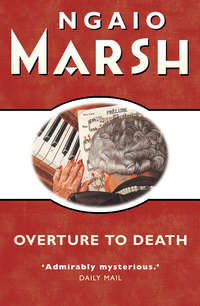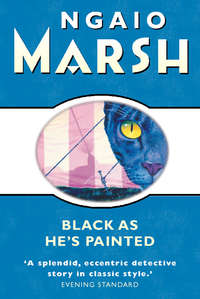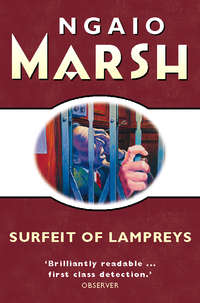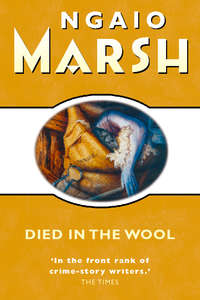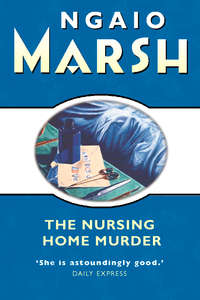
Полная версия
Colour Scheme
But when, hot and desperate, she had finally dressed, and covered the floral with a clean overall, she pressed her hands together. ‘Oh God,’ she thought, ‘make him like it here! Please dear God, make him like it.’
III
‘Can you possibly endure it?’ Dikon asked.
Gaunt was lying full length on the modern sofa. He raised his arms above his head. ‘All,’ he whispered, ‘I can endure all but Questing. Questing must be kept from me.’
‘But I told you –’
‘You amaze me with your shameless parrot cry of “I told you so”,’ said Gaunt mildly. ‘Let us have no more of it.’ He looked out of the corner of his eye at Dikon. ‘And don’t look so tragic, my good ass,’ he added. ‘I’ve been a small-part touring actor in my day. This place is strangely reminiscent of a one-night fit-up. No doubt I can endure it. I should be dossing down in an Anderson shelter, by God. I do well to complain. Only spare me Questing, and I shall endure the rest.’
‘At least we shall be spared his conversation this evening. He has a previous engagement. Lest he offer to put it off, I told him you would be desolated but had already arranged to dine in your rooms and go to bed at nine. So away he went.’
‘Good. In that case I shall dine en famille and go to bed when it amuses me. I have yet to meet Mr Smith, remember. Is it too much to hope that he will stage another fight?’
‘It seems he only gets drunk when his remittance comes in.’ Dikon hesitated and then asked: ‘What did you think of the Claires, sir?’
‘Marvellous character parts. Overstated, of course. Not quite West End. A number-one production on tour, shall we say? The Colonel’s moustache is a little too thick in both senses.’
Dikon felt vaguely resentful. ‘You captivated Mrs Claire,’ he said.
Gaunt ignored this. ‘If one could take them as they are,’ he said. ‘If one could persuade them to appear in those clothes and speak those lines! My dear, they’d be a riot. Miss Claire! Dikon, I didn’t believe she existed.’
‘Actually,’ said Dikon stiffly, ‘she’s rather attractive. If you look beyond her clothes.’
‘You’re a remarkably swift worker if you’ve been able to do that.’
‘They’re extraordinarily kind and, I think, very nice.’
‘Until we arrived you never ceased to exclaim against them. Why have you bounced round to their side all of a sudden?’
‘I only said, sir, that I thought you would be bored by them.’
‘On the contrary I’m agreeably entertained. I think they’re all darlings and marvellous comedy. What is your trouble?’
‘Nothing. I’m sorry. I’ve just discovered that I like them. I thought,’ said Dikon, smiling a little in spite of himself, ‘that the tableau on the verandah was terribly sad. I wonder how long they’d been grouped up like that.’
‘For ages, I should think. The dog was plainly exasperated and young Claire looked lethal.’
‘It is rather touching,’ said Dikon and turned away.
Mrs Claire and Barbara, wearing their garden hats and carrying trowels, went past the window on tiptoe, their faces solemn and absorbed. When they had gone a little way Dikon heard them whispering together.
‘In heaven’s name,’ cried Gaunt, ‘why do they stalk about their own premises like that? What are they plotting?’
‘It’s because I explained that you liked to relax before dinner. They don’t want to disturb you. I fancy their vegetable garden is round the corner.’
After a pause Gaunt said: ‘It will end in my feeling insecure and ashamed. Nothing arouses one’s self-abasement more than the earnest amateur. How long have they had this place?’
‘About twelve years, I think. Perhaps longer.’
‘Twelve years and they are still amateurs!’
‘They try so terribly hard,’ Dikon said. He wandered out on to the verandah. Someone was walking slowly round the warm lake towards the springs.
‘Hullo,’ Dikon said. ‘We’ve a caller.’
‘What do you mean? Be very careful, now. I’ll see no one, remember.’
‘I don’t think it’s for us, sir,’ Dikon said. ‘It’s a Maori.’
It was Rua. He wore the suit he bought in 1936 to welcome the Duke of Gloucester. He walked slowly across the pumice to the house, tapped twice with his stick on the central verandah post and waited tranquilly for someone to take notice of him. Presently Huia came out and gave a suppressed giggle on seeing her great-grandfather. He addressed her in Maori with an air of austerity and she went back into the house. Rua sat on the edge of the verandah and rested his chin on his stick.
‘Do you know, sir,’ said Dikon, ‘I believe it might be for us, after all? I’ve recognised the old gentleman.’
‘I won’t see anybody,’ said Gaunt. ‘Who is he?’
‘He’s a Maori version of the Last of the Barons. Rua Te Kahu, sometime journalist and MP for the district. I’ll swear he’s called to pay his respects.’
‘You must see him for me. We did bring some pictures, I suppose?’
‘I don’t think,’ Dikon said, ‘that the Last of the Barons will be waiting for signed photographs.’
‘You’re determined to snub me,’ said Gaunt amiably. ‘If it’s an interview, you’ll talk to him, won’t you?’
Colonel Claire came out of the house, shook hands with Rua and led him off in the direction of their own quarters.
‘It’s not for us after all, sir.’
‘Thank heavens for that,’ Gaunt said but he looked a little huffy nevertheless.
In Colonel Claire’s study, a room about the size of a small pantry and rather less comfortable, Rua unfolded the purpose of his call. Dim photographs of polo teams glared down menacingly from the walls. Rua’s dark eyes rested for a moment on a group of turbaned Sikhs before he turned to address himself gravely to the Colonel.
‘I have brought,’ he said, ‘a greeting from my hapu to your distinguished guest, Mr Geoffrey Gaunt. The Maori people of Wai-ata-tapu are glad that he has come here and would like to greet him with a cordial Haere mai.’
‘Oh, thanks very much, Rua,’ said the Colonel. ‘I’ll tell him.’
‘We have heard that he wishes to be quiet. If however he would care to hear a little singing, we hope that he will do us the honour to come to a concert on Saturday week in the evening. I bring this invitation from my hapu to your guests and your family, Colonel.’
Colonel Claire raised his eyebrows, opened his eyes and mouth, and glared at his visitor. He was not particularly surprised, but merely wore his habitual expression for absorbing new ideas.
‘Eh?’ he said at last. ‘Did you say a concert? Extraordinarily nice of you, Rua, I must say. A concert.’
‘If Mr Gaunt would care to come.’
Colonel Claire gave a galvanic start. ‘Care to?’ he repeated. ‘I don’t know, I’m sure. We should have to ask him, what? Sound the secretary.’
Rua gave a little bow. ‘Certainly,’ he said.
Colonel Claire rose abruptly and thrust his head out of the window. ‘James!’ he yelled. ‘Here!’
‘What for?’ said Dr Ackrington’s voice at some distance.
‘I want you. It’s my brother-in-law,’ he explained more quietly to Rua. ‘We’ll see what he thinks, um?’ He went out to the verandah and shouted, ‘Agnes!’
‘Hoo-oo?’ replied Mrs Claire from inside the house.
‘Here.’
‘In a minute, dear.’
‘Barbara!’
‘Wait a bit, Daddy. I can’t.’
‘Here.’
Having summoned his family, Colonel Claire sank into an armchair, and glancing at Rua gave a rather aimless laugh. His eye happened to fall upon a Wild West novel that he had been reading. He was a greedy consumer of thrillers, and the sight of this one lying open and close at hand affected him as an open box of chocolate affects a child. He smiled at Rua and offered him a cigarette. Rua thanked him and took one, holding it cautiously between the tips of his fingers and thumb. Colonel Claire looked out of the corners of his eyes at his thriller. He was long-sighted.
‘There was another matter about which I hoped to speak,’ Rua said.
‘Oh yes?’ said Colonel Claire. ‘D’you read much?’
‘My eyesight is not as good as it once was, but I can still manage clear print.’
‘Awful rot, some of these yarns,’ Colonel Claire continued, casually picking up his novel. ‘This thing I’ve been dipping into, now. Blood-and-thunder stuff. Ridiculous.’
‘I am a little troubled in my mind. Disturbing rumours have reached me …’
‘Oh?’ Colonel Claire, still with an air of absent-mindedness, flipped over a page.
‘… about proposals that have been made in regard to native reserves. You have been a good friend to our people, Colonel …’
‘Not at all,’ Colonel Claire murmured abstractedly, and felt for his reading glasses. ‘Always very pleased …’ He found his spectacles, put them on and, still casually, laid the book on his knee.
‘Since you have been at Wai-ata-tapu, there have been friendly relations between your family and my hapu. We should not care to see anyone else here.’
‘Very nice of you.’ Colonel Claire was now frankly reading, but he continued to wear a social smile. He contrived to suggest that he merely looked at the book because after all one must look at something. Old Rua’s magnificent voice rolled on. The Maori people are never in a hurry, and in his almost forgotten generation a gentleman led up to the true matter of an official call through a series of polite approaches. Rua’s approval of his host was based on an event twelve years old. The Claires arrived at Wai-ata-tapu during a particularly virulent epidemic of influenza. Over at Rua’s village there were many deaths. The Harpoon health authorities, led by the irate and overworked Dr Tonks, had fallen foul of the Maori people in matters of hygiene, and a dangerous deadlock had been reached. Rua, who normally exercised an iron authority, was himself too ill to control his hapu. Funeral ceremonies lasting for days, punctuated with long-drawn-out wails of greeting and lamentation, songs of death and interminable after-burial feasts maintained native conditions in a community lashed by a European scourge. Rua’s people became frightened, truculent and obstructive, and the health authorities could do nothing. Upon this scene came the Claires. Mrs Claire instantly translated the whole affair into terms of an English village, offered their newly built house as an emergency hospital and herself undertook the nursing, with Rua as her first patient. Colonel Claire, whose absence of mind had inoculated him against the arrogance of Anglo-Indianism, and who by his very simplicity had fluked his way into a sort of understanding of native peoples, paid a visit to the settlement, arranged matters with Rua, and was accepted by the Maori people as a rangitira, a person of breeding. He and his wife professed neither extreme liking nor antipathy for the Maori people, who nevertheless found something recognisable and admirable in both of them. The war had brought them closer together. The Colonel commanded the local Home Guard and had brought many of Rua’s older men into his division. Rua considered that he owed his life to his pakeha friends, and, though he thought them funny, loved them. It did not offend him, therefore, when Colonel Claire furtively read a novel under his very nose. He rumbled on magnificently with his story, in amiable competition with Texas Rangers and six-shooter blondes.
‘… there has been enough trouble in the past. The Peak is a native reserve and we do not care for trespassers. He has been seen by a certain rascal coming down the western flank with a sack on his shoulders. At first he was friendly with this no-good young fellow, Eru Saul, who is a bad pakeha and a bad Maori. Now they have quarrelled and their quarrel concerns my great-granddaughter Huia, who is a foolish girl but much too good for either of them. And Eru tells my grandson Rangi, and my grandson tells me, that Mr Questing is behaving dishonestly on the Peak. Because he is your guest we have said nothing, but now I find him talking to some silly young fellows amongst our people and putting a lot of bad ideas into their heads. Now that makes me very angry,’ said Rua, and his eyes flashed. ‘I do not like my young people to be taught to cheapen the culture of their race. It has been bad enough with Mr Herbert Smith, who buys whisky for them and teaches them to make pigs of themselves. He is no good. But even he comes to me to warn me of this Questing.’
The Colonel’s novel dropped with a loud slap. His eyebrows climbed his forehead, his eyes and mouth opened. He turned pale.
‘Hey?’ he said. ‘Questing? What about Questing?’
‘You have not been listening, Colonel,’ said Rua, rather crossly.
‘Yes, I have, only I didn’t catch everything. I’m getting deaf.’
‘I am sorry. I have been telling you that Mr Questing has been looking for curios on the Peak and boasting that in a little while Wai-ata-tapu will be his property. I have to come to ask you in confidence if this is true.’
‘What’s all this about Questing?’ demanded Dr Ackrington, appearing at the doorway in his dressing-gown. ‘’Evening, Rua. How are you?’
‘It began by being about Gaunt and a concert party,’ said the Colonel unhappily. ‘It’s only just turned into something in confidence about Questing.’
‘Well, if it’s in confidence, why the devil did you call me? There seems to be conspiracy in this house to deny my sciatica thermal treatment.’
‘I wanted to ask you if you thought Gaunt would like to go to a concert. Rua’s people have very kindly offered …’
‘How the devil do I know? Ask young Bell. Very nice of you, Rua, I must say.’
‘And then Rua began to talk about Questing and the Peak.’
‘Why don’t you call him Quisling and be done with it?’ Dr Ackrington demanded loudly. ‘It’s what he is, by God.’
‘James! I really must insist – You have no shred of evidence.’
‘Haven’t I? Haven’t I? Very well. Wait and see.’
Rua stood up. ‘If it is not troubling you too much,’ he said, ‘perhaps you would ask Mr Gaunt’s secretary …?’
‘Yes, yes,’ the Colonel agreed hurriedly. ‘Of course. Wait a minute, will you?’
He stumbled out of the room, and they heard him thump along the verandah towards Geoffrey Gaunt’s quarters.
Rua’s old eyes were very bright and cunning as he looked at Dr Ackrington, but he did not speak.
‘So he’s been trespassing, has he?’ asked Dr Ackrington venomously. ‘I could have told you that when the Hippolyte was torpedoed.’
Rua made a brusque movement with his wrinkled hands but still he did not speak.
‘He does it by night sometimes, doesn’t he?’ Dr Ackrington went on. ‘Doesn’t he go up by night, with a flash lamp? Good God, my dear fellow, I’ve seen it myself. Curios be damned.’
‘Somehow,’ Rua said mildly, ‘I have never been able to enjoy spy stories. They always seem to me to be incredible.’
‘Indeed!’ Dr Ackrington rejoined acidly. ‘So this country, alone in the English-speaking world, stands immune from the activities of enemy agents. And why, pray? Do you think the enemy is frightened of us? Amazing complacency!’
‘But he has been seen digging.’
‘Do you imagine he would be seen semaphoring? Of course he digs. No doubt he robs your ancestors’ graves. No doubt he will have some infamous booty to exhibit when he is brought to book.’
Rua pinched his lower lip and became very solemn. ‘I have felt many regrets,’ he said, ‘for the old age which compelled me to watch my grandsons and great-grandsons set out to war without me. But if you are right, there is still work in Ao-tea-roa for an old warrior.’ He chuckled, and Dr Ackrington looked apprehensively at him.
‘I have been indiscreet,’ he said. ‘Keep this under your hat, Rua. A word too soon and we shan’t get him. I may tell you I have taken steps. But, see here. There’s a certain amount of cover on the Peak. If your young people haven’t altogether lost the art of their forebears –’
‘We must arrange something,’ said Rua composedly. ‘Yes. No doubt something can be arranged.’
‘What is it, dear?’ said Mrs Claire, appearing abruptly in the doorway. ‘Oh! Oh, I thought Edward called me, James. Good evening, Rua.’
‘I did call you about half an hour ago,’ said her husband crossly from behind her back, ‘but it’s all over now. Old Rua was here with some – oh, you’re still there, Rua. Mr Gaunt’s secretary says they’ll be delighted.’
Barbara came running distractedly from the kitchen. She and her parents formed up in a sort of queue outside the door.
‘What is it, Daddy?’ she asked. ‘What do you want?’
‘Nobody wants anything,’ shouted her father angrily. ‘Everybody’s delighted. Why do you all come running at me?’
‘My people will be very pleased,’ said Rua. ‘I shall go now and tell them. I wish you all good evening.’
As he walked along the verandah his great-granddaughter, Huia, flew out and excitedly rang the dinner bell in his face. He gave her a good-natured buffet and struck for home. Dikon, looking startled, came out on the verandah followed by Gaunt. Huia, over-stimulated by her first view of the celebrity, flashed her eyes, laughed excitedly and continued to peal her bell until Barbara took it away from her.
‘I think that must be dinner,’ said Mrs Claire with a bright assumption of surprise, while their ears still rang with the din. She turned with poise towards Gaunt. ‘Shall we go in?’ she asked gently, and they formed up into a kind of procession, trailing after each other towards the dining-room door. At the last moment Simon appeared, as usual from the direction of the cabins, where he had a sort of workshop.
But the first night’s dinner was not to go forward without the intrusion of that particular form of grotesque irrelevance which Dikon was learning to associate with the Claires, for, as Gaunt and Mrs Claire approached the front door, a terrific rumpus broke out in the kitchen.
‘Where’s the Colonel?’ an agitated voice demanded. ‘I’ve got to see the Colonel.’
Smith, dishevelled and with threads of blood crossing his face, blundered through the dining-room from the kitchen, thrust Gaunt and Mrs Claire aside, and seized the Colonel by his coat lapels. ‘Here,’ he said, ‘you’ve got to do something. You’ve got to look after me. He tried to kill me.’
CHAPTER FOUR
Red for Danger
Dikon, mindful of his only other encounter with him and influenced by an exceedingly significant smell, came to the conclusion that Mr Smith was mad drunk. Perhaps a minute went by before he realised that he was merely terrified. It was obvious that the entire Claire family made the same mistake for they all, together and severally and entirely without success, tried to shut Smith up and hustle him away into the background. Finally it was Dr Ackrington who, after a sharp look at Smith, said to his brother-in-law: ‘Wait a minute now, Edward, you’re making a mistake. Come along with me, Smith, and tell me what it’s all about.’
‘I won’t come along with anyone. I’ve just been along with someone and it’s practically killed me. You listen to what I’m telling you! He’s a bloody murderer.’
‘Who is?’ asked Simon from somewhere in the rear.
‘Questing.’
‘Smith, for God’s sake!’ said the Colonel, and tried to lead him away by the elbow.
‘Leave me alone. I know what I’m talking about. I’m telling you.’
‘Oh, Daddy, not here!’ Barbara cried out, and Mrs Claire said: ‘No, Edward, please. Your study, dear.’ And, as if Smith were some recalcitrant schoolboy, she repeated in a hushed voice: ‘Yes, yes, much better in your study.’
‘But you’re not listening to me,’ said Smith. And, to the acute embarrassment of everybody except Gaunt, he began to blubber. ‘Straight out of the jaws of death,’ he cried piteously, ‘and you ask a chap to go to the study.’
Dikon heard Gaunt give a little cough of laughter before he turned to Mrs Claire and said: ‘We’ll remove ourselves.’
‘Yes, of course,’ said Dikon.
The doorway, however, was blocked by Simon and Mrs Claire, and before they could get out of the way Smith roared out: ‘I don’t want anybody to go. I want witnesses. You stay where you are.’
Gaunt looked good-humouredly from one horrified face to another, and said: ‘Suppose we all sit down.’
Barbara took her uncle fiercely by the arm. ‘Uncle James,’ she whispered, ‘stop him. He mustn’t. Uncle James, please.’
‘By all means let us sit down,’ said Dr Ackrington.
They filed solemnly and ridiculously into the dining-room and, as if they were about to witness a cabaret turn, sat themselves down at the small tables. This manoeuvre appeared to quieten Smith. He took up a strategic position between the tables. With the touch of complacency which must have appeared in the Ancient Mariner when he cornered the wedding guest, he embarked upon his story.
‘It was over at the level crossing,’ he began. ‘I’d been up the Peak with Eru Saul and I don’t mind telling you why. Questing’s been nosing around the Peak and the Maoris don’t like it. We’d seen him drive along the Peak road earlier in the evening. Eru and I reckoned we’d cut along by the bush track to a hideout in the scrub. We didn’t see anything. He must have gone up the other face of the hill if he was there at all. We waited for about an hour and then I got fed up and came down by myself. I hit the railroad about a couple of chains above the level crossing.’
‘By the railroad bridge?’ said Simon.
‘You’re telling me it was by the bridge,’ said Smith with extraordinary violence. ‘I’ll say it was by the bridge. And get this. The 5.15 from Harpoon was just about due. You know what it’s like. The railroad twists in and out of the scrub and round the shoulder of the hill and then comes through a wee tunnel. You can’t see or hear a thing. Before you know what’s happening, she’s on top of you.’
‘She is, too,’ agreed Simon, with an air of supporting Smith against unfair opposition.
‘The bridge is the worst bit. You can’t see the signals but you can see a bend in the Peak road above the level crossing. To get over the gully you can hop across the bridge on the sleepers, or you can wade the creek. I stood there wondering if I’d risk the bridge. I don’t like trains. There was a Maori boy killed on that bridge.’
‘There was, too.’
‘Yes; well, while I was kind of hesitating I saw Questing’s car come over the crest of the road and stop. He leant out of the driving window and saw me. Now listen. You’ve got to remember he could see the signal and I couldn’t. It’s the red and green light affair they put in after the accident. I saw him turn his head to look that way.’
Smith wiped his mouth with the back of his hand. He spoke quietly now, was no longer ridiculous, and held the attention of his audience. He sat down at an empty table and looked about him with an air of astonishment.
‘He waved me on,’ he said. ‘He could see the signal and he gave me the all-clear. Like this. I didn’t move at first and he did it again. See? A bit impatient, too, as much as to say: “What’s eating you? Hop to it.” Yes, well, I hopped. I’ve never liked the bridge. It’s a short stride between sleepers and you can see the creek through the gaps. Look. I’d got halfway when I heard her behind me, blowing her whistle in the tunnel. It’s funny how quick you can think. Whether to jump for it or swing from the end of a sleeper, or stand waving my arms and, if she didn’t pull up in time, dive for the engine. I thought about Questing, too, and how, if she got me, nobody’d know he gave me the office. And all the time I was hopping like a bloody ballet dancer, with the creek below clicking through the gaps. Like one of those dreams. Look, she was on the bridge when I jumped. I was above the bank by then. I suppose it wasn’t more than ten feet. I landed in a matagouri bush. Scratched all over, and look at my pants. I didn’t even try to get out of it. She rumbled over my head, and muck off the sleepers fell in my eyes. I felt funny. I mean my body felt funny, as if it didn’t belong to me. I was kind of surprised to find myself climbing the bank and it seemed to be someone else that was winded when I got to the top. And yet all the time I was hell-set on getting at Questing. And had he waited for me? He had not. ’Struth, I stood there shaking like a bloody jelly and I heard him tooting his horn away along the Peak road. I don’t know how I’d have got home if it hadn’t been for Eru Saul. Eru’d come down the hill and he saw what Questing swung across me. He’s a witness to it. He gave me a hand to come home. Look, Eru’s out there in the kitchen. You ask him. He knows.’ He turned to Mrs Claire. ‘Can I get Eru to come in, Mrs Claire?’


